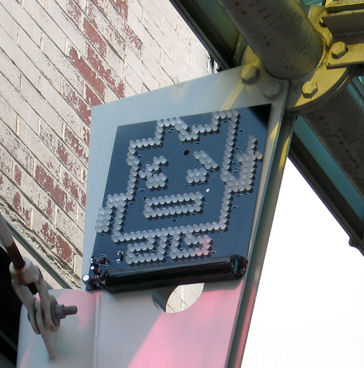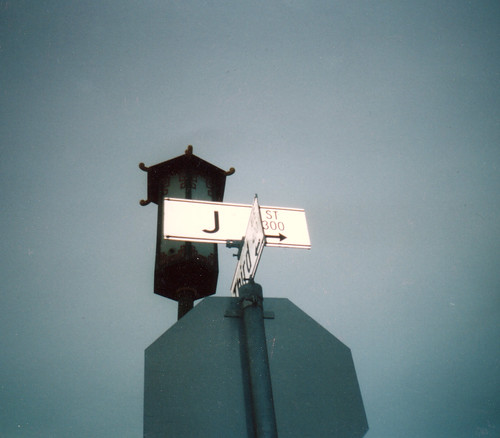We Are the Aqua Teens
...by enjoying the absurdity of avant-garde television, we can, in a way, prepare for onslaught of nonsense, that crazy day when the sky really does begin to fall.
If only I knew how to get a hold of the guy who wrote those words. Maybe he'll google his name, and Richard Claypool will stumble upon this piece of advice:
Find a journal of popular culture, and sell that article... because the Aqua Teen Hunger Force is money in the bank right now. When confused broadcasters struggle to explain some weird cartoon, over and over, you know the kids dig it.
See, Rick and I had a graduate class together at BGSU, and we both presented at a popular culture conference. His paper was not-so-simply titled, "Flying Magic Dinner: Aqua Teen Hunger Force as Avant-Garde Television."
A couple years later, and everybody knows about ATHF (as we fans in a hurry call it). Thanks to the quick (over)response of the Boston PD, and the hyperreal fear-mongering of the mainstream media, most of us should know about the "bomb hoax." To sum it up for those just joining us...
Nevermind. It's too surreal. Click on the link and read. Then click on the related stories. And the videos. Then do it on CNN.com. Then, after your stomach settles, do the same on Fox News.com.
Personally, if I have to hear one more out-of-touch "expert" start a sentence with, "Everyone should know that in a post-9/11 world"... Well, I'll probably have a minor aneuryism. Then, I'll loan them my copy of The Pessimist's Guide to History (it sits right above my toilet). Maybe they'll finally understand that The Event is a case of same old shit, new century. Humanity has spent millennia trying to justify the inexcusable act of killing a mass of innocent people.
But how we endeavor and carry on after such Events that should provide optimism. What we shouldn't be doing it mistaking stripped-down Lite Brites for "bomblike" devices of terror. That we have done so... it tells you how overly tight we as a culture are wound.
Anarchic, Absurd Aqua Teens
ATHF represents a step away from television animation's tendency to embrace traditional Disney-style animation and a step toward the potential popularity of reflexive, parodic, anarchic, essentially absurd entertainment that can undermine restrictive narrative conventions.
That's another prescient line from Rick's paper. In it, he compares the cartoon to the plays of Eugene Ionesco. The absurd drama of folks like Ionesco "exploded" the narrative conventions of their time. I realize that's a terrible pun, but I'm merely repeating the common term. It's easy to be ironic when life and literature does it for you.
What's truly amazing about Rick's analysis is how it applies to this media fiasco. The Aqua Teen ad stunt has "exploded" the narrative conventions found in our media. What conventions, you ask? The ones that tell us...
That a device, which has exposed wires and a power source, and is obviously "bomblike" in appearance, might be affixed to the street lamp right next to where you're reading this drivel! And it might actually be an explosive device!!!
Or, it could be a fucking modified Lite Brite, with a blocky alien flicking you off.
Oh, sure, this time! the narrative convention screams. But wait until next time! Next time, it could be TERRORISTS WANTING TO BLOW YOU UP AND DESTROY YOUR WAY OF LIFE!!!
Hopefully, the conventions' voice will get hoarse. Until then, let's get away from the inundation of narrative conventions, and look at why the other nine cities that had the Aqua Teen signs didn't freak out.
Lite Brite v. the Bomb
(or, "Why 90% of the cities said, 'eh'")
...he typically reacts with annoyance rather than awe or terror when his life is interrupted by robots, aliens, and monsters.
That's Rick talking about the ATHF character, Carl. You can't pronounce his last name, so don't worry yourself about it. Unlike Carl, the politicians, police, and pundits (and anyone else looking for airtime) expected you to worry about it. Rather than annoyance or a shrug, they wanted you to get worked up about these... blinky things. They could have been bombs, for Christ's sake!
Except, as others have pointed out:
- Terrorists tend not to put bombs in plain sight.
- If they do, they tend to not stick out, to look natural.
- In other words, they won't have obvious bits of wire sticking out.
- Fundamentalist Muslim terrorists would not use a representational image.
Or, as fellow confused citizen Jeff pointed out, "it is quite clearly depicting what appears to be a Tetris piece flipping someone off. If THAT was designed and intended to look like a bomb, then bomb design has gotten truly strange over the years."
Even more ludicrous has been the fear-mongering outcry of the talking heads -- narrative conventions -- whatever you wanna call them. You know the one. If these things were up for three weeks before anyone called the police, maybe our security is in trouble. We've become so lax, we can't spot a potential bomb until almost a month too late!!!
Maybe, instead, we listen to one of the accused "bomb hoaxers." Maybe, he told the media, nobody called the police because these aren't devices that threaten security. And most people can recognize that.
While we're on the subject, the media loves the accused artists responsible for the Boston Lite Brites. These little punk "kids" (in their late 20s), filled with hubris, laughed at the arraignment. And the mocked the media!
Good. The media deserves mocking, ya fuckers. And this is coming from a former journalism major, here. You are partially to blame for the fear and scary tone of this whole situation. Had you done even a slight amount of research, you would've realized what this was. Instead, you fanned the flames of fear. Not the "kids." You, and your citations of "a post-9/11 world."
And I would have laughed in the courtroom, too. The prosecuting attorney, forgetting to get off his rather tall horse, called the devices obvious bombs. They weren't Lite Brites, they were bombs. The "kids" weren't engaged in an ad stunt, they were knowingly sowing fear with fake bombs.
Pardon my reference to Penn & Teller, but... Bullshit!
The defendents know it's bullshit, the snickers from the courtroom gallery indicates they knew it's bullshit, and the judge knew. He didn't use "bullshit," of course. He told the prosecutor that "the suspects must intend to create a panic to be charged with placing hoax devices," and, "it appears the suspects had no such intent." (Taken from CNN.)
Quiet, Err; I'm transmitting rage
What disturbs me most about all this is not the initial overreaction. It's not even the media hyperbole that made it worse. It's how this thing will continue to escalate. The city officials have spent too much network and cable TV time vowing righteous vengeance upon these hooligans, and the greedy bastards who hired them!
(Uh, guys, your rhetoric is showing. No, seriously, you should probably wipe that up before you start foaming at the mouth again.)
Should Adult Swim have contacted the police in each city before hanging the signs? Maybe. Then again, what happens when the authorities don't think it's a good idea? Do you scrap it? Go ahead anyway, even though your expensive campaign might be stopped? And really, are we a country who is so stupidly fearful, we think creative expression is akin to terrorism?
Gods, I hope not. Watching the news networks, perhaps my hope is misplaced. The media has trapped us in narrative conventions of terror and fear. Our personal narratives envision terror around every corner, and a Lite Brite that will blow our heads off. Whatta you think, Rick?
Narrative conventions are traps. The guide audiences through well-worn paths, and as millions of media consumers continue to follow these paths, the earth under their feet wears away like the sediment in the Colorado River, and what was once a path becomes a canyon bottom. Unable to move in any direction but forward, once the media consumers grow accustomed to the directions of conventional narratives, they can't imagine narratives working any other way. This wouldn't be much of a problem if consumers weren't wont to imagine narrative forms into their own lives. The significance of this conventional narrative imagination to everyday life becomes most evident when 'real' circumstances do not resolve themselves nicely and loose ends don't get tied up.
And Aqua Teen Hunger Force explodes those conventions. As did this publicity gimmick. Could you sum it up a little better, Ignignokt?

Ah. Thanks.


2 Comments:
sooner or later, I s'pose I was bound to google myself. sweet blog, btw, and thanks for the flattering citations. how's life?
-Rick (rclaypo at gmail.com)
ارخص شركة مكافحة حشرات بالرياض
شركة تنظيف شقق بالرياض
شركة مكافحة حشرات بالرياض
شركة مكافحة صراصير بالرياض
شركة مكافحة فئران بالرياض
Post a Comment
<< Home